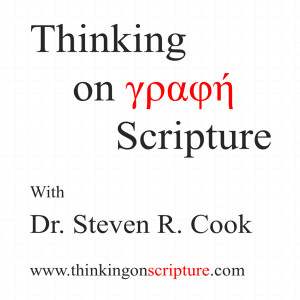
Saturday Jun 22, 2019
Jonah 2:1-10
In the previous chapter, Jonah had turned away from God’s call to preach to the Ninevites, so the Lord hurled a great storm on the sea and pressured him through the ship’s captain and sailors, who eventually threw him overboard in order to save their own lives. Jonah would have died, except God sent a great fish to swallow him and keep him alive (Jon 1:17). God used the fish, both as a form of punishment and as the means of his salvation. It’s likely Jonah did not adjust his thinking immediately to the situation, but had to work through what was happening to him. After a brief amount of time within the stomach of the fish, Jonah realized he was being kept alive supernaturally by God. This supernatural rescue prompted God’s prophet to construct a prayer of thanksgiving to the Lord (Jon 2:1). What follows in Jonah 2:2-9 reveals the prophet’s mind is saturated with a knowledge of God’s Word, as Jonah borrows heavily from various passages in the Psalms (see handout). While constructing his prayer, it cannot be determined if Jonah consciously drew excerpts from the various Psalms, or if they naturally percolated up in his thinking because his mind naturally thought this way from years of reading Scripture. Either way, Jonah thought and prayed biblically and the Lord heard his cry. Jonah said, “I called out of my distress to the LORD, and He answered me. I cried for help from the depth of Sheol; You heard my voice” (Jon 2:2). Jonah recognized God’s sovereignty over what was happening to him; for though the sailors had physically tossed him into the sea (Jon 1:15), he credits God with their actions (Jon 2:3). The sailors acted out of desperation and were motivated by fear of death; however, their attitudes and actions were influenced by the circumstances God controlled, as they were driven to do His will. Jonah does not blame the sailors, but interprets their actions from the divine perspective, realizing God was the One who controlled them; therefore, he could say of the Lord, “You had cast me into the deep” (Jon 2:3a). Jonah saw the sailors’ action of tossing him overboard as God’s action of discipline. They were His agents of punishment, like the storm, waves and fish. Though Jonah realizes he’s under divine discipline (Jon 2:4a), he also knows he is being saved, and that he will see the Lord’s temple, and this encourages him (Jon 2:4b). He briefly describes his time in the ocean, before the fish swallowed him, as a time when he thought he was being laid to rest in a watery grave. He states, “Water encompassed me to the point of death. The great deep engulfed me, weeds were wrapped around my head. I descended to the roots of the mountains. The earth with its bars was around me forever. But You have brought up my life from the pit, O LORD my God” (Jon 2:5-6). Jonah thought he was going to die, so his mind turned to the Lord, and he said, “While I was fainting away, I remembered the LORD, and my prayer came to You, into Your holy temple” (Jon 2:7). Jonah prayed to the only true God for salvation, and the Lord heard him. This stands in contrast to those who turn to idols and, by their own decision, forsake the mercy that could be theirs from the Lord (Jon 2:8). Jonah then vows to offer sacrifices to God with an attitude of thanksgiving (Jon 2:9a), and concludes his prayer, saying, “Salvation is from the LORD” (Jon 2:9b). Within this context, Jonah is speaking about his physical deliverance. The time Jonah spent in the fish was precisely what was needed to help him gain his spiritual sight; and once he had it, “Then the LORD commanded the fish, and it vomited Jonah up onto the dry land” (Jon 2:10). In this chapter, Jonah experienced both discipline and grace from the Lord, who “is opposed to the proud, but gives grace to the humble” (1 Pet 5:5b). The discipline came because the prophet was arrogant and disobedient to God’s call. The grace came when he humbled himself and turned back to the Lord with a willing heart. Jonah’s prayer of thanksgiving reflects his humility and grateful heart for God’s deliverance, for the prophet knows the Lord is “compassionate and gracious, slow to anger, and abounding in lovingkindness and truth” (Exo 34:6).
No comments yet. Be the first to say something!